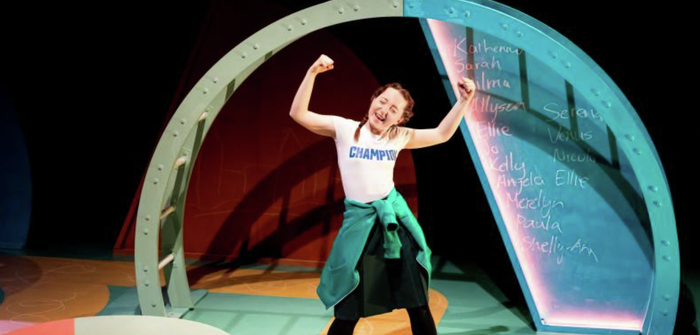Blackboard: Rhyme, rhythm and reasoning in the age of identity
Does Blackboard (Keep ya’ head up) leave us head over heels for its electrifying venture into the world of ‘tragicomedy’?

What does it mean if acceptance into one space entails rejection of another? Is identity what we are or what we do? Who defines the boundaries of identity in the first place? Blackboard fuses mediums - dramatic performance, music, spoken word - in an electrifying venture into these questions of emotion, conflict, and precarious identity.
We follow Adina, our protagonist, as she is admitted to the prestigious ‘Fawcett (née Rhodes) Institute’. As embodied by her three friends and the omnipresent ‘Voice of Expectation’ that trails her, Adina is confronted by the contradiction between her pride in her Black identity and the consequences admission to Fawcett may have on this. The ‘Black Council’ embodies the stakes of this tug-of-war, supported by the doomsday clock in the form of a tally count of Adina’s ‘transgressions’ marked on a chalkboard throughout. We watch Adina journey through the tribulations Fawcett presents, grappling with external and internal conflicts alike.
Without a doubt the standout moments are the spoken word interludes that pepper the narrative. Delivered directly to the audience, primarily by Christabel Okongwu (Adina), each section was a masterclass in bearing the intensely personal for all to see. Championing the conviction of those like Audre Lorde to June Jordan who have battled the Western, positivist epistemological standards with narrative, emotion, and standpoint, the writers put the spoken word to remarkable use. In these minute monologues, all of the complexities of a conflicted mind and soul are articulated with a cadence and rhyme that lifts its emotional weight. For these passages alone, Blackboard is a play worth seeing.
"Blackboard fuses mediums - dramatic performance, music, spoken word - in an electrifying venture into these questions of emotion, conflict, and precarious identity. ”
With several moments that stutter in an otherwise well-oiled production, Blackboard does have a few imperfections that accompany much student theatre. Some snippets of dialogue lacked nuance, made tragically more obvious when contrasted with the eloquence of the spoken word sections. I’d say Blackboard’s fault was to grapple with more than its limited runtime permitted, rendering some thematic elements underdeveloped or attended to with only a cursory glance. However, when, as with the To White Boy or Not to White Boy set, there was something meatier to bite into, Blackboard delivered on its lofty ambitions. Similarly, Okongwu does some of her finest work in the closing act of the play, navigating the lyrical demands of the spoken word without sacrificing even a moment of wrenching emotional delivery.
Aptly self-described as a ‘tragicomedy’, the show straddles this line with finesse. Fits of audience laughter could seamlessly be dimmed to pin-drop silent contemplation with no sense of being jolted about. With strong comedic performances from the vexatious ‘Britannia Bros’ - Martha Gazzard steals the show in particular - certain sequences demanded a nudge-your-friend, knee-slap kind of laughter. Whether white feminist ridicule, the plights of interracial dating, or the dramatic reveal of a pair of Union Jack shorts, the comedic beats are deftly interspersed throughout.
Whilst a winding road to its concluding message, it reaches its destination. What at first seemed to me a worrying oversimplification of the ‘Black identity’ - one with little space for negotiating the burden identity-formation carries and its intersectional gradient - found salvation in the final scenes of the play. Speaking back to the static, oftentimes isolating experience of battling both ‘The Voice of Expectation’ and ‘The Black Council’, Adina has her moment to recognise that the greatest defence for her identity is in not needing to defend it at all. Adina allows herself to be, in all the messy complications and contradictions occupying such a subject position entails. I would have preferred to linger with this message a little longer in the final act but it remains a well-versed resolution in its honesty.
“There is room for resistance, joy, and passion even in a space that can sometimes feel as though it is concertedly trying to empty you of it.”
Battling the brisk Cambridge cold in St Edward’s Passage as I waited for the show to start, I soon heard noise emanating from within the Corpus Playroom. I came to recognise it as the impassioned sound of pre-show chanting, performers hyping themselves up for the stage. In summing up my thoughts, that moment calls out to me as particularly symbolic for a show like Blackboard. It is a show packed with energy, filled to the brim with the many contentions of what Black identity has been expected to be, but ultimately optimistically concluding with the thrill of how much there is yet to explore. Just as that thrum from beyond the walls of the Corpus Playroom announced, there is room for resistance, joy, and passion even in a space that can sometimes feel as though it is concertedly trying to empty you of it. Blackboard’s greatest achievement is its conviction that even in those spaces that demand performance, one never loses the possibility of writing their own narrative in order to reckon with what sort of character they want to be.
Blackboard (Keep ya’ head up) is showing at the Corpus Playroom until Sat 24th February 2024.
 News / Eight Cambridge researchers awarded €17m in ERC research grants27 December 2025
News / Eight Cambridge researchers awarded €17m in ERC research grants27 December 2025 News / Clare Hall spent over £500k opposing busway 24 December 2025
News / Clare Hall spent over £500k opposing busway 24 December 2025 Comment / League tables do more harm than good26 December 2025
Comment / League tables do more harm than good26 December 2025 Comment / The ‘class’ of Cambridge24 December 2025
Comment / The ‘class’ of Cambridge24 December 2025 News / Caius mourns its tree-mendous loss23 December 2025
News / Caius mourns its tree-mendous loss23 December 2025









